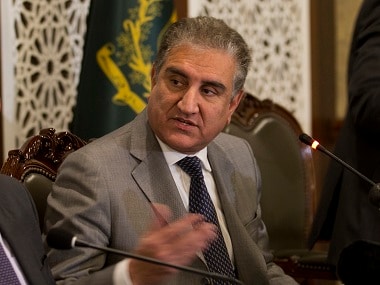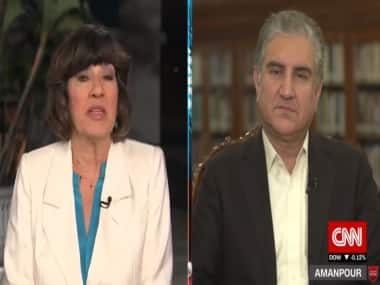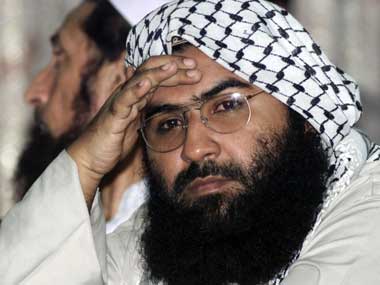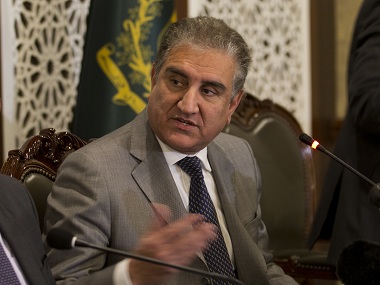In the ongoing escalation of tension between India and Pakistan, one man who has constantly found himself under the spotlight due to his office, is Pakistan foreign minister Shah Mahmood Qureshi. While on one hand, Qureshi has made repeated calls for dialogue between India and Pakistan, his contradictory and confusing stand on the terrorist outfit Jaish-e-Mohammed and the role it has played, has proven beguiling. Considering that the current round of hostilities between India and Pakistan worsened when Pakistan-based Jaish-Mohammed struck a Central Reserve Police Force (CRPF) convoy in Jammu and Kashmir’s Pulwama, killing at least 42 soldiers on 14 February, the focus of two key media interactions by Qureshi was the terror outfit and its leader. On 28 February, in an interview with CNN’s Christiane Amanpour, Qureshi claimed that he knew that Jaish chief Maulana Masood Azhar was in Pakistan. Then, on 1 March, speaking to BBC’s Secunder Kermani, Qureshi refused to accept that Jaish ever claimed responsibility for the Pulwama attack but ended up admitting that the Jaish leadership had been contacted by “people here”. [caption id=“attachment_6157281” align=“alignleft” width=“380”]
 File image of Pakistan Foreign Minister Shah Mahmood Qureshi. AP[/caption] The day after Pakistan prime minister Imran Khan announced that captured Indian Air Force pilot Wing Commander Abhinandan Varthaman will be released as a gesture of peace and as the “first step” to open negotiations with India,
Qureshi was firm when he told CNN
that Pakistan never wanted to escalate issues. With clear ease, he stressed that it was India who attacked Pakistan, violating the United Nations’ charter and undertaking an act of aggression. To a question by Amanpour on whether Pakistan would be open to war, Qureshi was a picture of restraint. “I hope not. That would be mutual suicide. Pakistan never wants to be in a hostile position,” he said. He added that he wishes that India, instead of attacking and blaming Pakistan, would simply share information on terror hideouts on its soil — which, incidentally, India had in a dossier sent to Paksitan just a day before, on 27 February. Through the course of Amanpour’s direct questioning, Qureshi extoled the virtues of the new government under Khan in Pakistan. “This is a new government with a new mindset. We want to live in peace,” he added, repeating that Khan’s government is unlikely to let anyone use Pakistan to foster terror against any country, even India. “Well then, let me ask you a direct question regarding the head of the Jaish-e-Mohammed. The Indian government would like you to have his name put on the international terrorists list. But your friends, the Chinese government, apparently on your behalf, have been vetoing that. Should he be put on the terrorist list?” Amanpour asked. It is only then that Qureshi seems to lose his composure slightly. [caption id=“attachment_6182421” align=“alignright” width=“380”]
File image of Pakistan Foreign Minister Shah Mahmood Qureshi. AP[/caption] The day after Pakistan prime minister Imran Khan announced that captured Indian Air Force pilot Wing Commander Abhinandan Varthaman will be released as a gesture of peace and as the “first step” to open negotiations with India,
Qureshi was firm when he told CNN
that Pakistan never wanted to escalate issues. With clear ease, he stressed that it was India who attacked Pakistan, violating the United Nations’ charter and undertaking an act of aggression. To a question by Amanpour on whether Pakistan would be open to war, Qureshi was a picture of restraint. “I hope not. That would be mutual suicide. Pakistan never wants to be in a hostile position,” he said. He added that he wishes that India, instead of attacking and blaming Pakistan, would simply share information on terror hideouts on its soil — which, incidentally, India had in a dossier sent to Paksitan just a day before, on 27 February. Through the course of Amanpour’s direct questioning, Qureshi extoled the virtues of the new government under Khan in Pakistan. “This is a new government with a new mindset. We want to live in peace,” he added, repeating that Khan’s government is unlikely to let anyone use Pakistan to foster terror against any country, even India. “Well then, let me ask you a direct question regarding the head of the Jaish-e-Mohammed. The Indian government would like you to have his name put on the international terrorists list. But your friends, the Chinese government, apparently on your behalf, have been vetoing that. Should he be put on the terrorist list?” Amanpour asked. It is only then that Qureshi seems to lose his composure slightly. [caption id=“attachment_6182421” align=“alignright” width=“380”] A screengrab of the CNN interview of Pakistani foreign minister Shah Mehmood Qureshi with Christiane Amanpour. YouTube[/caption] “We would be open to any step that would lead to de-escalation,” he says. “If India have any solid evidence, please send it (to Pakistan) and talk. Please initiate a dialogue,” he added. At this point, Amanpour asked him if the chief of Jaish-e-Mohammed, Masood Azhar, is present in Pakistan. “And if so, will you go after him?” “Well, he is in Pakistan, according to my information, and he is very unwell. He is unwell to the extent that he cannot leave his house, because he is really unwell, so that’s…that’s the information I have,” Qureshi said. In the portion of the
video of the interview
between 7:10-7:28, he can be seen making the claim on the Jaish leader’s health. Amanpour then went on to grill him on why even “a very ill” Azhar is not being arrested in the light of the tension he causes, to which Qureshi responded that all Pakistan needs in this regard are evidence that would be acceptable to the courts of Pakistan. Qureshi’s words on Azhar’s health implied a knowledge on his whereabouts on the part of the Paksitani government that the Indian media has pounced upon. It raised questions, not only on Pakistan’s complicity in Jaish’s attacks but also on whether Pakistan was indeed open to de-escalation. While the return of Wing Commander Abhinandan removed Jaish and Azhar from the forefront of diplomatic concerns in the time since the interview, on 1 March, Qureshi ended up bringing the focus back to him in the BBC interview. Through the interview, Qureshi largely echoed his earlier points on Pakistan’s predilection for peace and the aims of the new government under Khan. It is only when interviewer Kermani noted that the crisis began with Jaish’s attack, that Qureshi jumps in with his denial. [caption id=“attachment_4199375” align=“alignleft” width=“380”]
A screengrab of the CNN interview of Pakistani foreign minister Shah Mehmood Qureshi with Christiane Amanpour. YouTube[/caption] “We would be open to any step that would lead to de-escalation,” he says. “If India have any solid evidence, please send it (to Pakistan) and talk. Please initiate a dialogue,” he added. At this point, Amanpour asked him if the chief of Jaish-e-Mohammed, Masood Azhar, is present in Pakistan. “And if so, will you go after him?” “Well, he is in Pakistan, according to my information, and he is very unwell. He is unwell to the extent that he cannot leave his house, because he is really unwell, so that’s…that’s the information I have,” Qureshi said. In the portion of the
video of the interview
between 7:10-7:28, he can be seen making the claim on the Jaish leader’s health. Amanpour then went on to grill him on why even “a very ill” Azhar is not being arrested in the light of the tension he causes, to which Qureshi responded that all Pakistan needs in this regard are evidence that would be acceptable to the courts of Pakistan. Qureshi’s words on Azhar’s health implied a knowledge on his whereabouts on the part of the Paksitani government that the Indian media has pounced upon. It raised questions, not only on Pakistan’s complicity in Jaish’s attacks but also on whether Pakistan was indeed open to de-escalation. While the return of Wing Commander Abhinandan removed Jaish and Azhar from the forefront of diplomatic concerns in the time since the interview, on 1 March, Qureshi ended up bringing the focus back to him in the BBC interview. Through the interview, Qureshi largely echoed his earlier points on Pakistan’s predilection for peace and the aims of the new government under Khan. It is only when interviewer Kermani noted that the crisis began with Jaish’s attack, that Qureshi jumps in with his denial. [caption id=“attachment_4199375” align=“alignleft” width=“380”] File image of Masood Azhar. Reuters[/caption] The relevant portion spoken of below can be found between 2:14 and 3:11 time marks of
the interview
. “We are not sure of that,” says Qureshi to Kermani’s line. “You are not sure that Jaish-e-Mohammed is based in Pakistan or that they have claimed responsibility for it?” Kermani asks him. Qureshi, who began disagreeing halfway through Kermani’s question, says, “They have not (claimed responsibility).” “They have claimed responsibility,” the interviewer replies. “They have not. There’s confusion on that,” Qureshi says. “Where’s the confusion?” “The confusion is that the leadership, when contacted, they said no,” the Pakistan foreign minister replies. “The leadership’s been contacted by who, sir?” asks Kermani. “By, you know, by people over here, they say. We…um…we…you know, they deny, they deny that. That’s the confusion,” Qureshi insisted. “Who’s contacted the leadership of Jaish-e-Mohammed in Pakistan?” “People…there are people who are known to them.” “And they’ve said? They’ve said ‘we weren’t responsible’?” “They…um…claimed no responsibility.” Kermani then went on to press on the matter and brought up the statement issued by Jaish, claiming responsibility. “We’ve all received it,” he added. But Qureshi insisted that Jaish could not be convincingly blamed for the Pulwama attack, stressing that there are “conflicting reports” on this. The dossier on the Jaish-e-Mohammed was handed over to Islamabad by New Delhi and is
believed to contain
precise knowledge of the terrorist leaders present in the camp which India had claimed to have destroyed in the Balakot air strike. There are publicly available photographs and material of the Jaish-e-Mohammed headquarters in Bahawalpur, and a plethora of intelligence inputs on just what the group is up to in Kashmir, apart from
specific audio tapes
linking the group’s top leadership to the Pulwama attack.
File image of Masood Azhar. Reuters[/caption] The relevant portion spoken of below can be found between 2:14 and 3:11 time marks of
the interview
. “We are not sure of that,” says Qureshi to Kermani’s line. “You are not sure that Jaish-e-Mohammed is based in Pakistan or that they have claimed responsibility for it?” Kermani asks him. Qureshi, who began disagreeing halfway through Kermani’s question, says, “They have not (claimed responsibility).” “They have claimed responsibility,” the interviewer replies. “They have not. There’s confusion on that,” Qureshi says. “Where’s the confusion?” “The confusion is that the leadership, when contacted, they said no,” the Pakistan foreign minister replies. “The leadership’s been contacted by who, sir?” asks Kermani. “By, you know, by people over here, they say. We…um…we…you know, they deny, they deny that. That’s the confusion,” Qureshi insisted. “Who’s contacted the leadership of Jaish-e-Mohammed in Pakistan?” “People…there are people who are known to them.” “And they’ve said? They’ve said ‘we weren’t responsible’?” “They…um…claimed no responsibility.” Kermani then went on to press on the matter and brought up the statement issued by Jaish, claiming responsibility. “We’ve all received it,” he added. But Qureshi insisted that Jaish could not be convincingly blamed for the Pulwama attack, stressing that there are “conflicting reports” on this. The dossier on the Jaish-e-Mohammed was handed over to Islamabad by New Delhi and is
believed to contain
precise knowledge of the terrorist leaders present in the camp which India had claimed to have destroyed in the Balakot air strike. There are publicly available photographs and material of the Jaish-e-Mohammed headquarters in Bahawalpur, and a plethora of intelligence inputs on just what the group is up to in Kashmir, apart from
specific audio tapes
linking the group’s top leadership to the Pulwama attack.
Shah Mahmood Qureshi denies JeM claimed responsibility for Pulwama attack, admits 'people here' in touch with Masood Azhar
FP Staff
• March 2, 2019, 13:27:04 IST
Qureshi has made repeated calls for dialogue between India and Pakistan, yet it is his contradictory and confusing stand on the terrorist outfit Jaish-e-Mohammed and the role it has played, that has proven beguiling.
Advertisement
)
End of Article